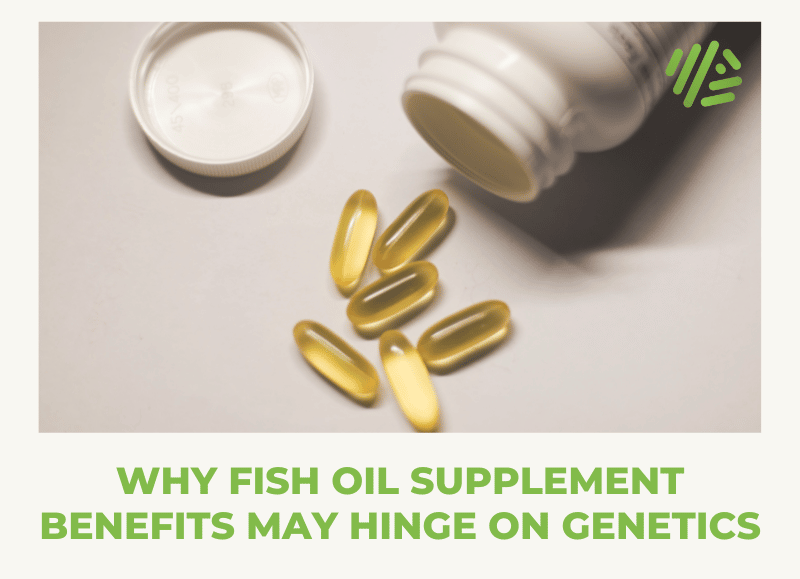Fish Oil Supplement Benefits: Why Genes Play a Big Role
Article at a Glance
- Research from a team led by a University of Georgia scientists suggests that taking fish oil only provides health benefits if you have a specific genetic background.
Genes Mentioned

Contents
It’s been 12 years since research emerged that urged us to consider taking fish oil to supplement our diet.1 The discovery, which was made in heart disease patients was said to protect against heart disease, reduce mental decline in old age and help to prevent age-related changes in the eye, and improve survival rates after a heart attack.2
What was more enticing was that they claimed fish oil preserves the genetic “fuse” that determines the lifespan of cells and may therefore be the true elixir of youth.
Before we go any further, you need to know that ‘fish oil’ could mean anything: Omega 3 only, omega 6 only, omega 9 only, or a combination of the 3.
Fish oil: what’s in a capsule and does it matter?
Fish oils are processed mainly from pelagic fatty-fish species and in the modern human diet of today, they are a major source of Long-Chain Polyunsaturated Fatty Acids (LCPUFAs), specifically omega-3. Fish oils are used as healthy additives and ingredients in many value-added food products or health-food capsules, often sold at high prices.
Fish oils are produced by a cooking process where they are pressed and purified in several steps and the oil is separated. Fish oils differ in their fatty acid composition depending on the species of origin and seasonal variations. Because fish oils are greatly unsaturated they require stabilization with antioxidants to protect against oxidation and therefore, deterioration of the product.
Oxidation causes the development of a rancid off-flavor and the degradation of essential nutrients, which affect sensory and nutritional qualities and the shelf-stability of fish oil-enriched foods. Also, oxidation induces the formation of potentially toxic compounds and makes the oils detrimental to human health.
So, make sure to purchase only high-quality products.
The fish oil gene?
In the past decade, genome-wide association (genetic) studies have identified SNP variants (genetic mutations that differ from person to person) that are associated with elevated or low blood levels of omega-3 fatty acids after fish oil supplementation. Research from a team led by a University of Georgia scientists suggests that taking fish oil only provides health benefits if you have a specific genetic background.4
This study was conducted in a cohort of 73,962 UK Biobank participants and focused on fish oil (and the omega-3 fatty acids it contains) and its effect on triglycerides which is a type of fat in the blood, as well as a biomarker for cardiovascular disease.
Fish oil study findings:
The participants were divided into two groups: those taking fish oil supplements (about 11,000) and those who were not. After running over 64 million tests, the results showed that a significant genetic variant or SNP at the GJB2 gene (rs112803755) came up as significant in study subjects who derived benefit from taking fish oil supplements.
Participants with the AG genotype who took fish oil decreased their triglycerides, and those with the AA genotype who took fish oil slightly increased their triglycerides. (A third possible genotype, GG, was not present in enough study volunteers to make conclusions). So, if you’re AA, taking a fish oil supplement could actually increase your triglycerides levels, which is not a good thing.
A similar association, albeit with a lower level of statistical significance, was found for SNP rs141844019. However, for this variant, which implicated a transporter gene ATP13A1, higher triglyceride levels that could be reduced by fish oil supplementation were associated with the major allele, C.
The levels of low-density lipoproteins (also known as ‘bad cholesterol’) also showed interaction effects between the genetic makeup and taking fish oil. For example, the most common A allele of the SNP rs77542162 affecting the protein sequence of the lipid transporter ABCA6was associated with lower ‘bad cholesterol’ levels, but it is the carriers of the rare alternative allele G (i.e., the AG or GG genotypes) that could benefit from fish oil supplements.
In contrast, the SNP rs799157 at the carbohydrate-responsive gene MLXIPL showed the opposite interaction between fish oil and bad cholesterol. People with the major C allele had generally lower levels of bad cholesterol, which tended to be even lower if they took fish oil. However, fish oil did not help the carriers of the rare T allele lower their cholesterol, and in fact potentially even increased them.
FADS2: Another gene of interest in affecting our response to fish oil supplementation
When essential fatty acids like omega 3 are ingested, they need to be metabolized and elongated into long-chain polyunsaturated fatty acids through the actions of a series of fatty acid desaturase enzymes. A key enzyme in this pathway, known as delta-6 desaturase, is encoded by the fatty acid desaturase 2 gene (FADS2).
Research has found that variants in the fatty acid desaturase genes, FADS1 and FADS2, are responsible for the differences we see in circulating levels of omega 3, especially in individuals who consume very little to no dietary omega 3.5 Specifically, studies show that patients with the GG genotype of this SNP of FADS2 (rs1535) have demonstrated an increased risk of inflammatory conditions and therapeutically benefit from omega 3 supplementation.
In the Verona Heart Study, 610 patients with and 266 patients without coronary artery disease underwent genotyping for FADS genetic variations. Four variants were associated with elevated inflammatory markers and had a greater risk of coronary artery disease.6 The authors also state that this is especially important in populations following a Western diet and that individuals carrying genotypes like GG mentioned above, may be prone to a proinflammatory response that contributes to heart disease. The Western diet is significant here because it is dangerously high in omega 6 and low in omega 3. This is bad because high levels of omega 6 have been linked to chronic pain and inflammation.
Another study found that personalized profiling of FADS2 genetic polymorphisms resulted in improving the selection of patients who would respond favorably to omega 3 therapy by reducing deterioration of the heart muscle during the healing phase following a heart attack. 5
In other words, if you have the right genotype, taking fish oil as a supplement is likely to have significant therapeutic benefits. These findings highlight the huge advantages of personalized nutrition in health and disease.
Reading Omega 3 supplement labels
So, what should you look out for on the labels of the supplements you’ve chosen? There are 11 types of omega-3 fatty acids, but the most common are ALA, DHA, and EPA:
- Alpha-linolenic acid (ALA): found in dark leafy greens and seeds.
- Docosahexaenoic acid (DHA): Found in fish oil and algae.
- Eicosapentaenoic acid (EPA): Also found in fish oils and algae and minimizes inflammation in the body and the brain, which, in turn, was found to alleviate symptoms of depression and anxiety.
Can You Get Omega-3 Without Fish Oils?
Yes, there is no need to take a fish oil supplement when high omega 3 foods, like wild shrimp and salmon are available.
The best alternative sources of omega 3s for Vegans can be found in plant-based foods such as:
- Walnuts
- Chia seeds
- Algae
- Brussels sprouts
- Leafy greens
- Hemp seeds
- Canola oil
- Flax



